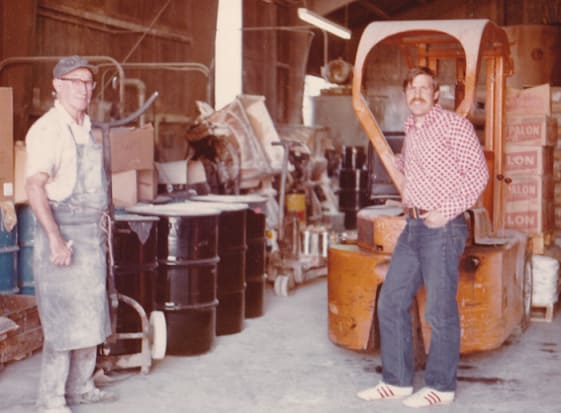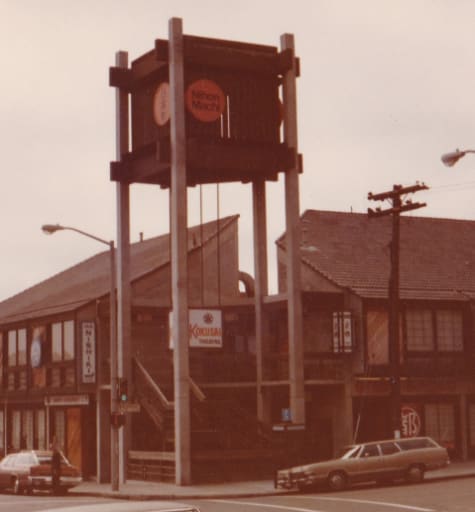以下は、ロンさんが1977年に訪日する少し前の話です。
1977年は、私にとっても大きな転換期でした。オイルショックの余波で就職が難しい時期ではありましたが、英会話学校に通うなど英語の勉強をしていたお陰で、外資系のUNIVACとIBMに内定。最終的にはIBMに行くことになりました。藤沢工場に配属になり、最初の3か月は現場実習。その後、磁気ディスク装置の開発に従事することになりました。年末には、その年のヒット曲、石川さゆりの「津軽海峡冬景色」を忘年会でいやいや歌ったのを覚えています。今は大好きな曲の一つです。
ロンさん、人生初めてのレイオフ、しかし、それが日本への気持ちを加速させる!すべての歯車が、日本に向けて回り始める!!
As I was only getting income from that part-time work and the Army Reserves, my bank account was steadily going down, and I needed more income, so I took a factory job over in San Francisco working in a putty and caulking compound manufacturer, called Goss & Goss. There were only four employees, an 80-year-old lady who owned the company and did the accounting, a general manager and two factory workers, of which I was one.

Working at Goss & Goss

Going to Japanese movies(サンフランシスコのジャパンタウン)
The other factory worker, Olin Cossairt, was in his early 60’s and about to retire. We were together during the work day, and he was a father figure to me. I’d been in contact with him ever since that time, and he even attended my wedding in Sacramento many years later.
I enjoyed working in that factory, as my mind was free to study right on the job while I produced the products in the factory.
Life at that time was going to my factory work, studying Japanese in the evenings at least twice a week, going to Japanese movies in Japan Town and going to my reserve meetings.
Then, one day the boss came to me and said I was laid off! I know the company was not that healthy, and the competition was far superior in just about every way possible. It was simply living on old customers the original founder, Mr. Goss had built up over the years before he died. At the time, being laid off was painful, but it turned out to be extremely good for me. I was out of a job and living on unemployment insurance and a little Army Reserve money.
On one occasion going to Sacramento to attend my Army Reserve meetings, my mother introduced me to a man who just came back from Japan. He was on a 1-year English teaching assignment and was looking for a replacement, but the job would not be available for six months. That was perfect, as my 6-year term in Army Reserve was to end about at that time. So, there was my chance to get to Japan. I took the assignment and decided to devote all of my time to study Japanese while on unemployment insurance.
Being laid off was one of the best things that could have happened to me. I got full unemployment insurance and studied full time. As I was learning for personal growth only, I decided to go to the nearest University with a Japanese class and simply sit in the class.
Who says education is expensive! If you want the knowledge, and not the degree, it can be very close to free. In those days, the popular language was Chinese, as President Nixon just opened diplomatic relations with China (around 1976). The Chinese classes were packed while the Japanese classes couldn’t gather even 10 students. Even though I was not even enrolled in the school, the teachers allowed me to sit in the class, do the drills in class and use the language lab anytime I liked! It was all free, was a very productive time in my life and gave me what was to be one of the most powerful skills I have used throughout my career. When I hit Japan, I was off and running with skills to learn the Japanese language.
Those years were early in my development for my life’s purpose. They were small steps toward interacting within the international community.
次章、いよいよRonさんは日本に行きます。日本文化にどう適応していったのか?
1977年は、私にとっても大きな転換期でした。オイルショックの余波で就職が難しい時期ではありましたが、英会話学校に通うなど英語の勉強をしていたお陰で、外資系のUNIVACとIBMに内定。最終的にはIBMに行くことになりました。藤沢工場に配属になり、最初の3か月は現場実習。その後、磁気ディスク装置の開発に従事することになりました。年末には、その年のヒット曲、石川さゆりの「津軽海峡冬景色」を忘年会でいやいや歌ったのを覚えています。今は大好きな曲の一つです。
ロンさん、人生初めてのレイオフ、しかし、それが日本への気持ちを加速させる!すべての歯車が、日本に向けて回り始める!!
As I was only getting income from that part-time work and the Army Reserves, my bank account was steadily going down, and I needed more income, so I took a factory job over in San Francisco working in a putty and caulking compound manufacturer, called Goss & Goss. There were only four employees, an 80-year-old lady who owned the company and did the accounting, a general manager and two factory workers, of which I was one.

Working at Goss & Goss

Going to Japanese movies(サンフランシスコのジャパンタウン)
The other factory worker, Olin Cossairt, was in his early 60’s and about to retire. We were together during the work day, and he was a father figure to me. I’d been in contact with him ever since that time, and he even attended my wedding in Sacramento many years later.
I enjoyed working in that factory, as my mind was free to study right on the job while I produced the products in the factory.
Life at that time was going to my factory work, studying Japanese in the evenings at least twice a week, going to Japanese movies in Japan Town and going to my reserve meetings.
Then, one day the boss came to me and said I was laid off! I know the company was not that healthy, and the competition was far superior in just about every way possible. It was simply living on old customers the original founder, Mr. Goss had built up over the years before he died. At the time, being laid off was painful, but it turned out to be extremely good for me. I was out of a job and living on unemployment insurance and a little Army Reserve money.
On one occasion going to Sacramento to attend my Army Reserve meetings, my mother introduced me to a man who just came back from Japan. He was on a 1-year English teaching assignment and was looking for a replacement, but the job would not be available for six months. That was perfect, as my 6-year term in Army Reserve was to end about at that time. So, there was my chance to get to Japan. I took the assignment and decided to devote all of my time to study Japanese while on unemployment insurance.
Being laid off was one of the best things that could have happened to me. I got full unemployment insurance and studied full time. As I was learning for personal growth only, I decided to go to the nearest University with a Japanese class and simply sit in the class.
Who says education is expensive! If you want the knowledge, and not the degree, it can be very close to free. In those days, the popular language was Chinese, as President Nixon just opened diplomatic relations with China (around 1976). The Chinese classes were packed while the Japanese classes couldn’t gather even 10 students. Even though I was not even enrolled in the school, the teachers allowed me to sit in the class, do the drills in class and use the language lab anytime I liked! It was all free, was a very productive time in my life and gave me what was to be one of the most powerful skills I have used throughout my career. When I hit Japan, I was off and running with skills to learn the Japanese language.
Those years were early in my development for my life’s purpose. They were small steps toward interacting within the international community.
次章、いよいよRonさんは日本に行きます。日本文化にどう適応していったのか?

















